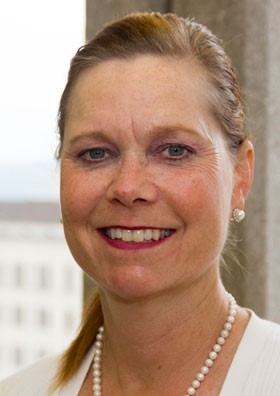Journal of Appalachian Health Editorial Board
Wendy Braund, MD, MPH, MSEd, FACPM
 Dr. Wendy E. Braund is the Director of the Center for Public Health Practice, Associate Dean for Practice, and Professor of Health Policy and Management at the University of Pittsburgh Graduate School of Public Health. Previously, she served as Wyoming State Health Officer and Public Health Division Administrator for the Wyoming Department of Health. Prior to moving west, Dr. Braund was employed by the U.S. Department of Health and Human Services, serving in the Office of the Assistant Secretary for Health, Office of Disease Prevention and Health Promotion, and subsequently in the Health Resources and Services Administration, Bureau of Health Professions.
Dr. Wendy E. Braund is the Director of the Center for Public Health Practice, Associate Dean for Practice, and Professor of Health Policy and Management at the University of Pittsburgh Graduate School of Public Health. Previously, she served as Wyoming State Health Officer and Public Health Division Administrator for the Wyoming Department of Health. Prior to moving west, Dr. Braund was employed by the U.S. Department of Health and Human Services, serving in the Office of the Assistant Secretary for Health, Office of Disease Prevention and Health Promotion, and subsequently in the Health Resources and Services Administration, Bureau of Health Professions.
Dr. Braund is a 2007 graduate of the Johns Hopkins Bloomberg School of Public Health Preventive Medicine Residency Program and is board certified in General Preventive Medicine and Public Health. She is a Fellow of the American College of Preventive Medicine. Her degrees include a BA from Duke University, MSEd from the University of Pennsylvania Graduate School of Education, MD from the Pennsylvania State University College of Medicine, and MPH from the Johns Hopkins Bloomberg School of Public Health.
Dr. Braund has no competing editorial or research interests regarding her role on the Editorial Board of the Journal of Appalachian Health.
Kelly Brunst, PhD
 Dr. Kelly Brunst is an Associate Professor of Epidemiology and Director of Graduate Studies in the Department of Environmental and Public Health Sciences at the University of Cincinnati. As an environmental health epidemiologist, Dr. Brunst has over 15 years
of experience coordinating longitudinal epidemiological studies and applying molecular epidemiological methodologies. Her transdisciplinary research platform focuses on studying the effects of environmental exposures on the programming of biological mechanisms
related to chronic conditions such as poor respiratory and neurodevelopment outcomes. She has conducted several studies looking at how environmental factors (e.g., air pollution, fluoride, tobacco smoke exposure) independently and jointly (with social exposures)
impact health outcomes. Many of her projects also utilize molecular biomarkers (e.g., epigenetics, mitochondriomics) to provide mechanistic insight as to how environmental risk factors impact health. This work has been continually supported over the past 15
years by the NIH/NIEHS and the EPA.
Dr. Kelly Brunst is an Associate Professor of Epidemiology and Director of Graduate Studies in the Department of Environmental and Public Health Sciences at the University of Cincinnati. As an environmental health epidemiologist, Dr. Brunst has over 15 years
of experience coordinating longitudinal epidemiological studies and applying molecular epidemiological methodologies. Her transdisciplinary research platform focuses on studying the effects of environmental exposures on the programming of biological mechanisms
related to chronic conditions such as poor respiratory and neurodevelopment outcomes. She has conducted several studies looking at how environmental factors (e.g., air pollution, fluoride, tobacco smoke exposure) independently and jointly (with social exposures)
impact health outcomes. Many of her projects also utilize molecular biomarkers (e.g., epigenetics, mitochondriomics) to provide mechanistic insight as to how environmental risk factors impact health. This work has been continually supported over the past 15
years by the NIH/NIEHS and the EPA.
Dr. Brunst earned her B.A. in Biology from Thomas More College (Crestview Hills, KY), her Ph.D. in Epidemiology from the University of Cincinnati (Cincinnati, OH) and completed a postdoctoral fellowship in the Department of Pediatrics at the Icahn School of Medicine at Mount Sinai (New York, NY).
Dr. Brunst has no competing editorial or research interests regarding her role on the Editorial Board of the Journal of Appalachian Health.
Erik L. Carlton, DrPH, MS, FACHE
 Dr. Carlton is Associate Dean, Director of Graduate Studies, and Associate Professor of Health Policy, Management and Leadership at the West Virginia University School of Public Health. He is also Director of the West Virginia Public Health Training Center. A board-certified healthcare administrator, Dr. Carlton has nearly two decades of leadership experience in both the private and public sectors; and has consulted numerous hospital systems, health departments, and other healthcare organizations, as well as several universities and other large businesses. A member of the Healthy Work Design External Advisory Council at the National Institute of Occupational Safety and Health, his current research focuses on psychological safety with an emphasis in both healthcare and higher education.
Dr. Carlton is Associate Dean, Director of Graduate Studies, and Associate Professor of Health Policy, Management and Leadership at the West Virginia University School of Public Health. He is also Director of the West Virginia Public Health Training Center. A board-certified healthcare administrator, Dr. Carlton has nearly two decades of leadership experience in both the private and public sectors; and has consulted numerous hospital systems, health departments, and other healthcare organizations, as well as several universities and other large businesses. A member of the Healthy Work Design External Advisory Council at the National Institute of Occupational Safety and Health, his current research focuses on psychological safety with an emphasis in both healthcare and higher education.
His previous scholarship focused heavily on the integration of healthcare and public health systems and on university-community relations. The author of three books, Dr. Carlton has a strong presence in global healthcare leadership development, having lived in both France and China and having trained clinical and administrative leaders from nearly 60 countries. The bulk of Erik’s career has been spent focused on issues of rural and Appalachian health and he has led behavioral health intervention and public health workforce training efforts in three Appalachian states (Kentucky, Tennessee, and West Virginia). Dr. Carlton holds a Doctor of Public Health degree in Health Services Management and a Master of Science degree in Family Studies with an emphasis in Marriage and Family Therapy, both from the University of Kentucky.
Dr. Carlton has no competing editorial or research interests regarding her role on the Editorial Board of the Journal of Appalachian Health.
Paul C. Erwin, MD, DrPH, MPH
 Paul C. Erwin is Dean of the School of Public Health at the University of Alabama at Birmingham. Prior to his appointment in August 2018, Dr. Erwin served as head of the Department of Public Health at the University of Tennessee, Knoxville. Before he came into academia, Dr. Erwin served 16 years with the Tennessee Department of Health, with most of that time directing a region of 15 county health departments in rural Appalachia. He is an Associate Editor of the American Journal of Public Health and serves on the editorial board of the Journal of Public Health Management and Practice.
Paul C. Erwin is Dean of the School of Public Health at the University of Alabama at Birmingham. Prior to his appointment in August 2018, Dr. Erwin served as head of the Department of Public Health at the University of Tennessee, Knoxville. Before he came into academia, Dr. Erwin served 16 years with the Tennessee Department of Health, with most of that time directing a region of 15 county health departments in rural Appalachia. He is an Associate Editor of the American Journal of Public Health and serves on the editorial board of the Journal of Public Health Management and Practice.
Dr. Erwin has no competing editorial or research interests regarding his role on the Editorial Board of the Journal of Appalachian Health.
Adam Hege, PhD, MPA
 Adam Hege is currently Associate Professor and Director of the CEPH-accredited Undergraduate Public Health program in the Department of Health and Exercise Science at Appalachian State University. Adam’s formal graduate education includes a PhD in Community Health Education from the University of North Carolina at Greensboro and a Master of Public Administration from Appalachian State University. Currently, he teaches Community Health and Health Policy, Ethics and Law, and has previously taught courses focused on rural public health and professional development in public health. His research interests are broadly on health inequities and the underlying social and environmental determinants of health. Specifically, this has included examining disparities among rural populations in the surrounding Appalachia communities of western NC, with a focus on food insecurity, adverse childhood experiences, access to care, and other factors related to quality of life.
Adam Hege is currently Associate Professor and Director of the CEPH-accredited Undergraduate Public Health program in the Department of Health and Exercise Science at Appalachian State University. Adam’s formal graduate education includes a PhD in Community Health Education from the University of North Carolina at Greensboro and a Master of Public Administration from Appalachian State University. Currently, he teaches Community Health and Health Policy, Ethics and Law, and has previously taught courses focused on rural public health and professional development in public health. His research interests are broadly on health inequities and the underlying social and environmental determinants of health. Specifically, this has included examining disparities among rural populations in the surrounding Appalachia communities of western NC, with a focus on food insecurity, adverse childhood experiences, access to care, and other factors related to quality of life.
In addition, his work examines systems-level and policy-oriented occupational health disparities experienced among U.S. long-haul truck drivers, a highly vulnerable working population. Adam research has led to published articles in many journals, and he has co-authored two textbook chapters and co-edited the textbook Public Health Nutrition: Rural, Urban, and Global Community-Based Practice. Adam serves as the Associate Editor of Family & Community Health, is on the Editorial Board of Behavioral Medicine, and on the Governing Council of the American Public Health Association, representing the Public Health Education and Health Promotion section.
Dr. Hege has no competing editorial or research interests regarding her role on the Editorial Board of the Journal of Appalachian Health.
Laura L. Hungerford, DVM, MPH, PhD, CPH, FNAP
 Dr. Laura Hungerford is a veterinary epidemiologist and Head of the Department of Population Health Sciences at Virginia Tech, which houses the MPH, DVM/MPH, MD/MPH, BSPH and Certificate in Public Health Programs; the Center for Public and Corporate Veterinary Medicine; and the Center for Public Health Practice and Research. She has been active in teaching a wide range of epidemiology and public health courses to graduate, medical, and veterinary students, as well as providing continuing education for veterinarians and other health professionals. She is a member of numerous professional associations and was elected as a Distinguished Fellow in the National Academies of Practice.
Dr. Laura Hungerford is a veterinary epidemiologist and Head of the Department of Population Health Sciences at Virginia Tech, which houses the MPH, DVM/MPH, MD/MPH, BSPH and Certificate in Public Health Programs; the Center for Public and Corporate Veterinary Medicine; and the Center for Public Health Practice and Research. She has been active in teaching a wide range of epidemiology and public health courses to graduate, medical, and veterinary students, as well as providing continuing education for veterinarians and other health professionals. She is a member of numerous professional associations and was elected as a Distinguished Fellow in the National Academies of Practice.
Her publications, grants, and research interests include collaborative studies that take a One Health approach to risk factors for infectious and zoonotic diseases, application of geographic information system and spatial statistical analyses, and dynamic modeling in multidisciplinary health problems. She has collaborated on developing innovations for drug review at FDA, human infectious disease modeling, and projects with zoos and wildlife agencies involving raccoons, deer, frogs, sea turtles, big cats, birds, and aquatic mammals.
Dr. Hungerford has no competing editorial or research interests regarding her role on the Editorial Board of the Journal of Appalachian Health.
Karen Minyard, PhD, MN, BN
 Karen Minyard, Ph.D. is the chief executive officer of the Georgia Health Policy Center at Georgia State University. She has led the center since 2001 and is also a research professor with the Department of Public Management and Policy in the Andrew Young School of Policy Studies. Minyard connects the research, policy, and programmatic work of the center across issue areas including: population health, health and health care financing, health in all policies, long-term services and supports, rural health, child health and well-being, behavioral health, health system transformation, and community health systems development. Minyard has applied a realist approach to much of her work over the last six years. This work involves multiple projects, the largest of which included eight rounds of sensemaking over five years to revise the original literature-based theory about health system transformation.
Karen Minyard, Ph.D. is the chief executive officer of the Georgia Health Policy Center at Georgia State University. She has led the center since 2001 and is also a research professor with the Department of Public Management and Policy in the Andrew Young School of Policy Studies. Minyard connects the research, policy, and programmatic work of the center across issue areas including: population health, health and health care financing, health in all policies, long-term services and supports, rural health, child health and well-being, behavioral health, health system transformation, and community health systems development. Minyard has applied a realist approach to much of her work over the last six years. This work involves multiple projects, the largest of which included eight rounds of sensemaking over five years to revise the original literature-based theory about health system transformation.
She received a bachelor’s degree in nursing from the University of Virginia, a master’s degree in nursing from the Medical College of Georgia, and a doctoral degree in business administration with a major in strategic management and minor in health care financing from Georgia State University.
Dr. Minyard has no competing editorial or research interests regarding her role on the Editorial Board of the Journal of Appalachian Health.
Michele Morrone, PhD
 Dr. Morrone is a Professor of Environmental Health at Ohio University and the Director of the Appalachian Rural Health Institute. She earned a Ph.D. in environmental planning from The Ohio State University, an M.S. in forest resources from the University of New Hampshire, and a B.S. in natural resources from The Ohio State University. Dr. Morrone previously served as the Chief of the Office of Environmental Education at the Ohio Environmental Protection Agency. She is the author of numerous papers on environmental topics including the community impacts of hydraulic fracturing, environmental health disparities in Appalachia, and environmental justice. She has published four books and her fifth and current book project is Ailing in Place: Environmental Health in Appalachia. She was the 2012 Fulbright Research Scholar in Science and the Environment at McMaster University in Hamilton, Ontario, Canada and was a member of a group to present Appalachian-related research in Ukraine in 2014. Her research focuses on Appalachian health issues, specifically the relationship between environmental conditions and health outcomes.
Dr. Morrone is a Professor of Environmental Health at Ohio University and the Director of the Appalachian Rural Health Institute. She earned a Ph.D. in environmental planning from The Ohio State University, an M.S. in forest resources from the University of New Hampshire, and a B.S. in natural resources from The Ohio State University. Dr. Morrone previously served as the Chief of the Office of Environmental Education at the Ohio Environmental Protection Agency. She is the author of numerous papers on environmental topics including the community impacts of hydraulic fracturing, environmental health disparities in Appalachia, and environmental justice. She has published four books and her fifth and current book project is Ailing in Place: Environmental Health in Appalachia. She was the 2012 Fulbright Research Scholar in Science and the Environment at McMaster University in Hamilton, Ontario, Canada and was a member of a group to present Appalachian-related research in Ukraine in 2014. Her research focuses on Appalachian health issues, specifically the relationship between environmental conditions and health outcomes.
Dr. Morrone has no competing editorial or research interests regarding her role on the Editorial Board of the Journal of Appalachian Health.





Social Media Links